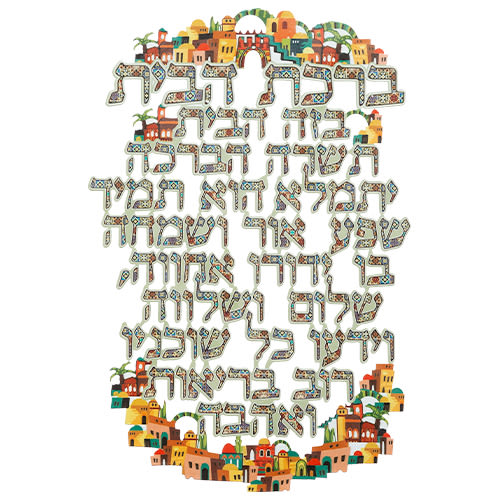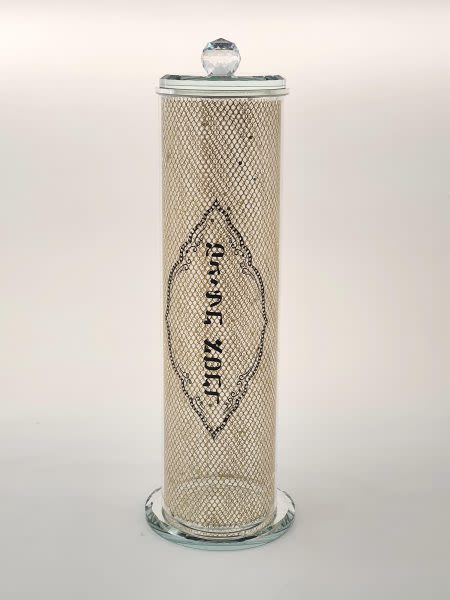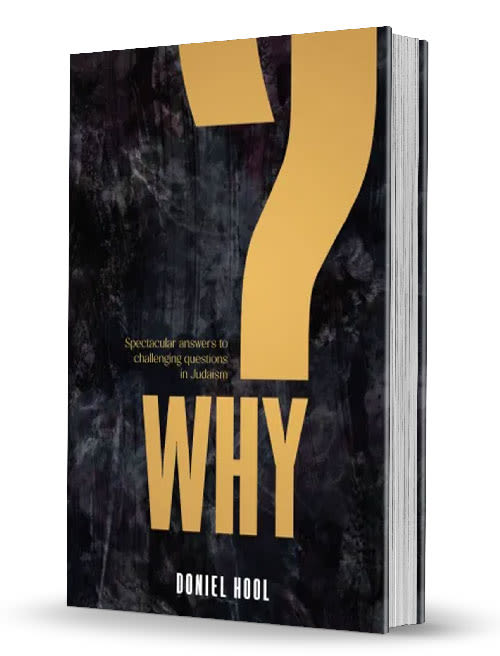
Seeing with Eyes of EMUNA
The world admires human intellect and ingenuity; it’s difficult to speak in praise of simple faith. Sometimes it seems, even to a believer...

The world admires human intellect and ingenuity; it’s difficult to speak in praise of simple faith. Sometimes it seems, even to a believer, that emunah is like a burden we have to accept because we have no choice.
In Praise of Emunah
The world has a Creator Who created it ex nihilo. He gave each creature its unique nature and essence and placed each one of His millions of creatures in the proper place. He is and will always be the Prime Mover behind all the events that occur to them, bringing them to their ultimate purpose.
God. The Unique One, completely beyond human comprehension. He is above time, and the entire universe is within Him. He creates the laws of nature. He is the One Above, Incorporeal, Infinite, Hidden and Concealed.
And yet, He is everywhere. He alone is the cause of everything; He sees everything and directs every step of each and every creature. “The entire world is filled with His glory.” He is close to us at all times. This is the One we believe in.
The world admires human intellect and ingenuity; it’s difficult to speak in praise of simple faith. Sometimes it seems, even to a believer, that emunah is like a burden we have to accept because we have no choice. We have to believe in something we can’t fathom. So we end up intellectualizing over emunah, forgetting that not everything can be explained.
Rebbe Nachman of Breslov says, “The world considers emunah a small thing. But I consider emunah to be a very big thing” (Sichot HaRan 33). “The main thing is emunah. Everyone should search within himself and strengthen himself in emunah” (Likutei Moharan II, 5:1).
“In truth, emunah is a very strong matter. A person’s life is greatly strengthened by emunah. When a man has emunah, even if he suffers, God forbid, he can comfort himself and revitalize himself. God will have mercy on him and improve his situation, for the suffering is for his good and brings atonement. In the end, God will improve his situation, in this world and in the World to Come. But someone who doesn’t have emunah has no one to turn to when troubles come; he has nothing to give him comfort and revitalize him” (Sichot HaRan 32).
We need to clarify our emunah by using metaphors and prayers, so that it will be an emunah based on knowledge, and not an empty, disappointing emunah. But we must never be ashamed of our emunah, and we don’t need to hide it with intellectualizing.
We should be proud of our emunah and say: “I believe with complete faith that the Creator, Blessed is His name, creates and guides all creatures, and that He alone made, makes, and will make everything.” “I believe with complete faith that the Creator, Blessed is His Name, knows all the deeds of human beings and their thoughts, as it is said, ‘He fashions their hearts all together, He comprehends all their deeds’ (Tehillim 33:15).” (From the Thirteen Principle of Faith, found in the Siddur).
Contradiction and Paradox
When we believe in God and in His Divine Providence, we continue to have emunah even if we don’t understand His ways. The Greek gods were created by petty men who believed in an enlarged copy of human beings with all their frailties, lusts, and egoism. Any "god" that we can understand with our limited intellect would be a petty god indeed.
It makes sense that we have questions about God’s ways, says Rebbe Nachman, because the Creator’s thoughts are infinitely beyond ours and incomprehensible to our intellect. If we understood everything about His ways, how would He be High and Mighty? He is the Creator and we are just limited, created beings! (Likutei Moharan, 2:52).
How was the world was created in such a way that the Creator is hidden from us?
Based on the Etz Chaim by the Arizal, Rebbe Nachman explains, “God created the world out of His mercy, because He wanted to reveal His mercy, and if there were no creation, upon whom would He show mercy?
“When God wanted to create the world, there was no place to create it, because everything was [full of] the Ein Sof (the Infinite). Therefore, He constricted the Light to the sides, and by means of this tzimtzum (constriction) He made a ‘vacated space,’ and within the vacated space he brought into existence all the days (measurements of time) and the measurements (limits), which constitute the creation of the universe.
“The ‘vacated space’ was crucial for creation, because without the vacated space there would have been no place for creation. The tzimtzum of the vacated space is impossible to conceive or understand, and only in the Ultimate Future (in the World to Come) will we be able to understand it.
“This is because we must say two contradictory things about the vacated place: namely the presence and absence of God’s essence. The vacated space came into existence though the tzimtzum, when God (to the extent that we can express it) constricted His own essence. God’s essence therefore does not exist in this space. If his essence were there, this Space would not be considered vacated and everything would be [full of] the Infinite, and there would be no place for the creation of the universe.
“The actual truth, however, is that God’s essence is in this space. For we know for certain that nothing can exist without His Life Force. Therefore, [because of this contradiction], it’s impossible to comprehend the concept of the Vacated Space at all, except in the Ultimate Future” (Likutei Moharan, Torah 64:1).
From the moment we are born, we exist in a paradox, with two contradictory realities existing side by side: namely the presence and absence of God’s essence, the soul and the body, the Light of the Ein Sof opposite a temporal world of limits.
Freedom to Choose
Our senses reveal only the outer shell of existence. Thus we can have free will. Do we follow our eyes or search for a way to reveal the hidden layers of the universe? Do we chase after the external, in which there seems to be an absence of God’s presence, or do we choose the inner reality of His essence?
Is the Vacated Place - the entire universe —completely empty of God’s essence? Or should we believe that “the actual truth, however, is that God’s essence must be in this space,” and, by means of our emunah, should we try to fill the entire “vacated place” with a new light.
We see the darkness and believe in the light. We see the creation and believe in its Creator. That is the essence of emunah.
The source of atheism is the concealment of that light, and is born from a confused heart. Emunah is the answer to that denial, and when we have an answer to the troubling questions, we discover God hidden within.
“Behold, by means of emunah, we believe that God created all the worlds and is the First Cause of them all. Since He is the First Cause, the Vacated Space is an expression of His wisdom, and God’s essence must certainly be in this space.
“Only it’s impossible to conceive this and discover there His essence. Because if a man could find an answer for all the denial and confusion in his heart, this would be the same as saying that he could find God within the questions, and there would no longer be a Vacated Place and there would be no place for creation.
“The actual truth is that there is an answer for all the questions, and God’s essence is certainly there (and in this we believe, even though we can’t understand it, due to the limits of our intellect)… Therefore the Jewish people are called ‘transgressors,’ because they use their emunah to ‘transgress’ on all the chachamot, cleverness, and confusion” (Ibid.).
The Quantum Leap
With emunah, we are able to leap over the Vacated Space, over the existential emptiness in our hearts that are a result of the huge emptiness of the vacated space that appears devoid of God’s essence. Jews comprehend well the limits of our comprehension.
When we reach the point where our intellect can no longer reach, we open the “eyes of emunah” that gaze on both the external world and the inner reality. We look deeply until we succeed in seeing God’s essence, which enlightens the creation and our inner world as it did before the act of creation.
Emunah is a feeling that exists deep within us and is necessitated by the existence of light and the Creator of the light. When we develop our power of emunah, we’ll have more confidence in what lies beyond our senses. We’ll build within ourselves a vessel capable of containing, and even understanding, what is going on behind the curtains of the physical world.
“The main creation of the vessels is through emunah,” wrote Reb Nosson, “because emunah is a vessel that can accept the light of wisdom.”
We can understand, but first we must believe. This develops the possibility of receiving Divine wisdom.
“This is because the light of God Himself, as far as we can express it, is impossible to accept, because the light is so great, for it is the light of the Ein Sof (Infinite One), Blessed be He. It is impossible to receive it except though many, many vessels. Only through emunah can we create the vessels of holiness. A vessel is formed by means of emunah, when one believes in God without any cleverness or intellect… and he receives light in the vessel, or a comprehension, according to the strength of the emunah he has.”
Similarly, in Sefer HaMiddot, Rebbe Nachman wrote: “At first one must believe in God and only afterwards will he begin to understand with his intellect” (Emunah, 20).
Emunah is more than an intellectual understanding. “Now it came to pass in the thirtieth year in the fourth [month] on the fifth day of the month, as I was in the midst of the exile by the river Chebar-the heavens opened up, and I saw visions of God” (Yechezkiel/Ezekiel 1:1). Rebbe Nachman pointed out that in Hebrew, the first letters of words—“the heavens opened up, and I saw visions of God” spell emunah. With the power of strong emunah one can see visions of the Divine reality and the Heavenly worlds.
The Way to Develop Emunah
Emunah should not be abstract, continues Rebbe Nosson. One needs to learn the principles of emunah from someone who is an expert in them. “The main thing is belief in the Sages. Because of God’s greatness and loftiness, one can merit an aspect of emunah only through the wise men and the true righteous men of the generation (who are knowledgeable in all the ways of the Torah). They achieved their understanding of the Almighty through their efforts and through their perfect emunah. They can draw His light and goodness to us and bring holy emunah to us” (Likutei Halachot, Yoreh Deah, Hechsher Keilim 2:1).
Developing emunah, as taught by the wise men who are the experts, comes from speaking about emunah. We develop emunah through prayer, which is entirely composed of emunah, speaking with others, and self-introspection.
“Emunah depends on a man’s speech, as it is said: ‘I will make known your faithfulness with my mouth’ (Tehillim 89). When one speaks about emunah, this in itself is emunah, and it also brings about more emunah” (Likutei Moharan, chelek 2, Torah 44).
“When a man has doubts about his emunah in God, he should say out loud: ‘I believe with complete faith that the Creator is One, the very first and the very last” (Sichot HaRan 142).
Another revelation: “The main perfection in emunah comes through the belief that God desires our service in this world. Our forefathers, Avraham (Abraham) and Moshe (Moses) revealed this truth. This is a foundation for the entire Torah” (Likutei Halachot, Yoreh Deah, Hilchot Shavuot 2:2).
“The main reason for the exile is a lack of emunah,” writes Rebbe Nachman. When we strengthen ourselves in emunah, we’re benefiting the entire world and not just ourselves.
The Task of our Generation
Every generation has its own particular mission in bringing about the ultimate rectification of the world. Our generation, the generation of the footsteps of the Moshiach, needs to perfect their emunah. We find proof of this in the words of the Sages, who explain that the leaders of each generation tried to teach the main service of God for each generation, and in the end they concluded: “Habakkuk established it on one principle: ‘A righteous man will live with his emunah’” (Makot 24).
Our generation contends with great darkness; the hand of God is hidden and we don’t see His Divine Providence. Yet, despite this awesome darkness, people still believe in His kindness and goodness.
The prophet Yechezkiel relates:
“The hand of God came upon me, and carried me out in the spirit of God, and set me down in the midst of the valley, and that was full of bones. And He made me pass by them round about, and lo! they were exceedingly many on the surface of the valley, and lo! they were exceedingly dry. Then He said to me; "Son of man, can these bones become alive?" And I answered, "O the Lord, God, You [alone] know." And He said to me, "Prophesy over these bones, and say to them, ‘O dry bones, hear the word of God.’”
Yechezkiel found it difficult to believe that these dry bones would come to life, but God commanded him and the miracle happened before his eyes:
“And I prophesied as He had commanded me, and the spirit came into them, and they lived and stood on their feet, a very great army, exceedingly so…”
This miracle wasn’t meant for Yechezkiel alone, but for all of us. God explained the meaning of the miracle.
“Then He said to me, "Son of man, these bones are all the house of Israel. Behold they say, ‘Our bones have become dried up, our hope is lost, we are clean cut off to ourselves’” (Yechezkiel 37:1-11).
Rashi comments: “`These bones are all the house of Israel’—They are an intimation and an example of the entire house of Israel in their exile, for they say, ‘Our bones have become dried up from the troubles; our hope is lost, and what further hope can we have for salvation?’” (ibid. 11).
The Malbim offers another explanation: “`Our bones have become dried up’— They no longer had a King or prophet, or a mighty army, until they were in the grips of despair.”
Amidst death threatening on all sides, amidst the dryness that sucks the juice from our bones and the vitality from our heart, there are still believers! “Will these bones live?” asks God, and His faithful answer: “Yes, they shall live.” Against all realistic explanations and against the materialistic world steeped in hedonism, we believe and we will continue to believe!
Feelings of holiness and a search for purity will live again. Even if we’re trampled unto the dust, we’ll rise again to overthrow the evil. We shall give birth to a new life, a life full of light and truth. “These bones are all the house of Israel!”
Belief in a new life comes through the power of prayer. “Prayer is above nature. Nature may obligate a certain outcome, but prayer can change that outcome. This is miraculous, and for this one needs emunah. One must believe that God makes everything anew, and He can change anything according to His will” (Likutei Moharan 7:1).
The King and his Daughter
Rebbe Nachman tells the story of the Prime Minister who searched for the King’s lost daughter. For years he wandered in search of her, in deserts and uninhabited wildernesses. Finally, he met giants and asked for their help to find the mountains of gold and diamond mines. “There you find me,” the princess wrote to him in their last encounter. But the giants laughed at his request. “Don’t you see that she’s telling you nonsense?” “If you’ll take my advice,” offered one of them, “Go back home, there’s no such thing.”
“There’s no purpose in life and no holiness,” claim the giants of the world. “Man’s intellect and culture are all there is.” But the hero of our story wasn’t swayed by their words and answered with courage: “I know with all certainty that there is!” Rebbe Nachman concludes his story: “And in the end, he found her.” There is a King and the King’s daughter exists; God exists and the soul exists. We can attain holiness if we seek it. There is hope and redemption. The dry bones shall live. These are the words of the believer: “I know with all certainty that there is!”
(From: www.levhadvarim.com)












Tell us what you think!
Thank you for your comment!
It will be published after approval by the Editor.